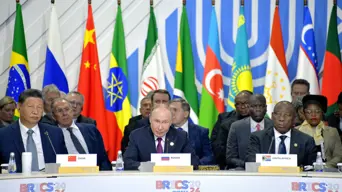BRICS looking to 'diversify international relations' amid Donald Trump's tariffs
Donald Trump threatened a 100% tariff if BRICS adopts a single currency to replace the US dollar in trade.

China's Xi Jinping (left), Russia's Vladimir Putin (centre) and President Cyril Ramaphosa (right) at the BRICS Summit in Kazan, Russia on 24 October 2024. Picture: GCIS
702's Bongani Bingwa interviews Gustavo de Carvalho from the South African Institute of International Affairs.
Listen below:
BRICS foreign ministers have met to coordinate their response to a wave of new tariffs imposed by US President Donald Trump and to discuss a joint defence of the global trade system.
The core group of BRICS countries namely Brazil, Russia, India, China, and South Africa, and newer members: Egypt, Saudi Arabia, the United Arab Emirates, Ethiopia, Indonesia and Iran – has drawn sharp criticism from Trump.
He has threatened to impose an additional 100% in tariffs should the group move forward with plans to adopt a single currency to replace the dominant US dollar in trade relations.
According to De Carvalho, since Trump took office, the global status quo has been shifting – especially for BRICS countries.
He says that for these countries, the United States has become increasingly unpredictable and unreliable.
De Carvalho adds that the meeting which started in Rio de Janeiro yesterday and is continuing today, offers BRICS nations a critical opportunity to discuss and develop strategies for managing the “systemic shocks” currently affecting the global economy.
"They are looking to diversify their international relations, to find new models and new approaches that reduces their own vulnerability towards the United States."
- Gustavo de Carvalho – South African Institute of International Affairs
De Carvalho argues that Africa’s best chance to thrive in a complex international landscape – and to gain greater influence in global discussions – lies not in dependence on either China or the United States.
Instead, he sees intra-African trade as the most untapped opportunity and the "strongest possibility that Africa will be able to navigate this very tricky international environment."
Scroll up to the audio player to listen to the interview.